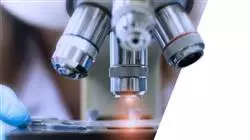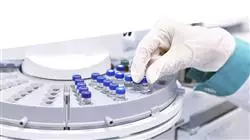University certificate
The world's largest faculty of physiotherapy”
Introduction to the Program
With this Postgraduate diploma you will get all the keys in the types of graphics and survival analysis to add value to your own and collaborative projects"

The strong demand that exists in the current research sector, directly confronts individuals who develop physiotherapeutic practice with lack of knowledge. This reality means that on many occasions patients reject non-pharmacological therapies and lean towards the most intrusive intervention, deteriorating their wellbeing. This is the reason why companies make a narrow selection to choose the professionals that make up their teams.
Taking this reality into account, TECH has designed a comprehensive program in Physiotherapeutic Research that aims to update the knowledge of specialists in this field. To this end, the Technological University has provided itself with a team of experts in the area of Health Sciences that it has developed and that will be in charge of teaching the subject. It is a study that deepens the management of clinical information, key to the management of the social and health field, as well as research and publication of articles, theses and applied reports. Thus, it is a unique opportunity for experts who are committed to new technologies applied to their professional performance.
The present program has a 100% online modality, which allows for the monitoring of the subject without leaving aside the other activities of the daily life of the specialists, such as their employment or motherhood. In this sense, TECH has also incorporated innovative pedagogical tools that facilitate and speed up the assimilation of the contents. An example of this is the Relearning methodology, which exempts students from long hours of memorization common in other orthodox programs.
Intervene in scientific studies by applying statistics and R which are decisive in the advancement of physiotherapeutic research with this Postgraduate diploma"
This Postgraduate diploma in Tools for Health Research contains the most complete and up-to-date scientific program on the market. The most important features include:
- Case studies presented by experts in Health Sciences Research
- The graphic, schematic, and practical contents with which they are created, provide medical information on the disciplines that are essential for professional practice
- Practical exercises where self-assessment can be used to improve learning
- Its special emphasis on innovative methodologies
- Theoretical lessons, questions to the expert, debate forums on controversial topics, and individual reflection assignments
- Content that is accessible from any fixed or portable device with an Internet connection t
Don't be left behind in the updating process, master the new statistical methods thanks to the theoretical and practical knowledge of TECH"
The program's teaching staff includes professionals from the sector who contribute their work experience to this program, in addition to renowned specialists from leading societies and prestigious universities.
Its multimedia content, developed with the latest educational technology, will provide the professional with situated and contextual learning, i.e., a simulated environment that will provide an immersive education programmed to learn in real situations.
The design of this program focuses on Problem-Based Learning, by means of which the professional must try to solve the different professional practice situations that are presented throughout the academic course. For this purpose, the student will be assisted by an innovative interactive video system created by renowned experts.
Get all the knowledge about Poisson and Negative Binomial regression inflated by zeros and offer a more accurate service in your area of work"

Delve into the treatment of outlier data and use advanced technological tools to gain in-depth knowledge of R strategies"
Why study at TECH?
TECH is the world’s largest online university. With an impressive catalog of more than 14,000 university programs available in 11 languages, it is positioned as a leader in employability, with a 99% job placement rate. In addition, it relies on an enormous faculty of more than 6,000 professors of the highest international renown.

Study at the world's largest online university and guarantee your professional success. The future starts at TECH”
The world’s best online university according to FORBES
The prestigious Forbes magazine, specialized in business and finance, has highlighted TECH as “the world's best online university” This is what they have recently stated in an article in their digital edition in which they echo the success story of this institution, “thanks to the academic offer it provides, the selection of its teaching staff, and an innovative learning method aimed at educating the professionals of the future”
A revolutionary study method, a cutting-edge faculty and a practical focus: the key to TECH's success.
The most complete study plans on the university scene
TECH offers the most complete study plans on the university scene, with syllabuses that cover fundamental concepts and, at the same time, the main scientific advances in their specific scientific areas. In addition, these programs are continuously being updated to guarantee students the academic vanguard and the most in-demand professional skills. In this way, the university's qualifications provide its graduates with a significant advantage to propel their careers to success.
TECH offers the most comprehensive and intensive study plans on the current university scene.
A world-class teaching staff
TECH's teaching staff is made up of more than 6,000 professors with the highest international recognition. Professors, researchers and top executives of multinational companies, including Isaiah Covington, performance coach of the Boston Celtics; Magda Romanska, principal investigator at Harvard MetaLAB; Ignacio Wistumba, chairman of the department of translational molecular pathology at MD Anderson Cancer Center; and D.W. Pine, creative director of TIME magazine, among others.
Internationally renowned experts, specialized in different branches of Health, Technology, Communication and Business, form part of the TECH faculty.
A unique learning method
TECH is the first university to use Relearning in all its programs. It is the best online learning methodology, accredited with international teaching quality certifications, provided by prestigious educational agencies. In addition, this disruptive educational model is complemented with the “Case Method”, thereby setting up a unique online teaching strategy. Innovative teaching resources are also implemented, including detailed videos, infographics and interactive summaries.
TECH combines Relearning and the Case Method in all its university programs to guarantee excellent theoretical and practical learning, studying whenever and wherever you want.
The world's largest online university
TECH is the world’s largest online university. We are the largest educational institution, with the best and widest online educational catalog, one hundred percent online and covering the vast majority of areas of knowledge. We offer a large selection of our own degrees and accredited online undergraduate and postgraduate degrees. In total, more than 14,000 university degrees, in eleven different languages, make us the largest educational largest in the world.
TECH has the world's most extensive catalog of academic and official programs, available in more than 11 languages.
Google Premier Partner
The American technology giant has awarded TECH the Google Google Premier Partner badge. This award, which is only available to 3% of the world's companies, highlights the efficient, flexible and tailored experience that this university provides to students. The recognition as a Google Premier Partner not only accredits the maximum rigor, performance and investment in TECH's digital infrastructures, but also places this university as one of the world's leading technology companies.
Google has positioned TECH in the top 3% of the world's most important technology companies by awarding it its Google Premier Partner badge.
The official online university of the NBA
TECH is the official online university of the NBA. Thanks to our agreement with the biggest league in basketball, we offer our students exclusive university programs, as well as a wide variety of educational resources focused on the business of the league and other areas of the sports industry. Each program is made up of a uniquely designed syllabus and features exceptional guest hosts: professionals with a distinguished sports background who will offer their expertise on the most relevant topics.
TECH has been selected by the NBA, the world's top basketball league, as its official online university.
The top-rated university by its students
Students have positioned TECH as the world's top-rated university on the main review websites, with a highest rating of 4.9 out of 5, obtained from more than 1,000 reviews. These results consolidate TECH as the benchmark university institution at an international level, reflecting the excellence and positive impact of its educational model.” reflecting the excellence and positive impact of its educational model.”
TECH is the world’s top-rated university by its students.
Leaders in employability
TECH has managed to become the leading university in employability. 99% of its students obtain jobs in the academic field they have studied, within one year of completing any of the university's programs. A similar number achieve immediate career enhancement. All this thanks to a study methodology that bases its effectiveness on the acquisition of practical skills, which are absolutely necessary for professional development.
99% of TECH graduates find a job within a year of completing their studies.
Postgraduate Diploma in Tools for Health Research
At TECH Global University, we offer you a unique opportunity to obtain a degree in a fundamental area for the advancement of health in today's society. Our Postgraduate Diploma in Health Research Tools is designed for health professionals who wish to acquire the necessary skills to conduct quality research and contribute to scientific knowledge in the field of health. The virtual classes we offer will allow you to access this training in a flexible way, adapting to your schedule and needs. In addition, our lessons are dynamic and participatory, optimized with exclusive digital content and cutting-edge academic methodologies, allowing you to interact with professionals with extensive experience in the field of health research. You will learn the best practices for the design, implementation and analysis of research studies, as well as the use of specialized tools and software. In addition, you will have access to up-to-date bibliographic resources and cutting-edge research platforms.
Earn a degree in applied health research
Upon completion of this postgraduate degree, you will be qualified to develop high-level research in the field of health, contributing to the advancement of scientific knowledge and improving the quality of health care. You will be able to design and carry out epidemiological studies, clinical trials, systematic reviews and meta-analyses, among other types of research. You will also be able to apply your knowledge in evidence-based decision making, health policy development and clinical practice improvement. Don't miss this opportunity to become a Postgraduate Diploma in health research tools at TECH Global University. Our graduate degree will provide you with the skills you need to excel in your professional field and contribute to the advancement of health science. enroll now and start boosting your career!""







